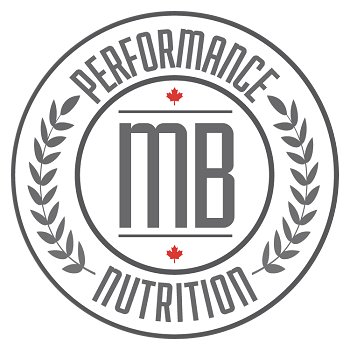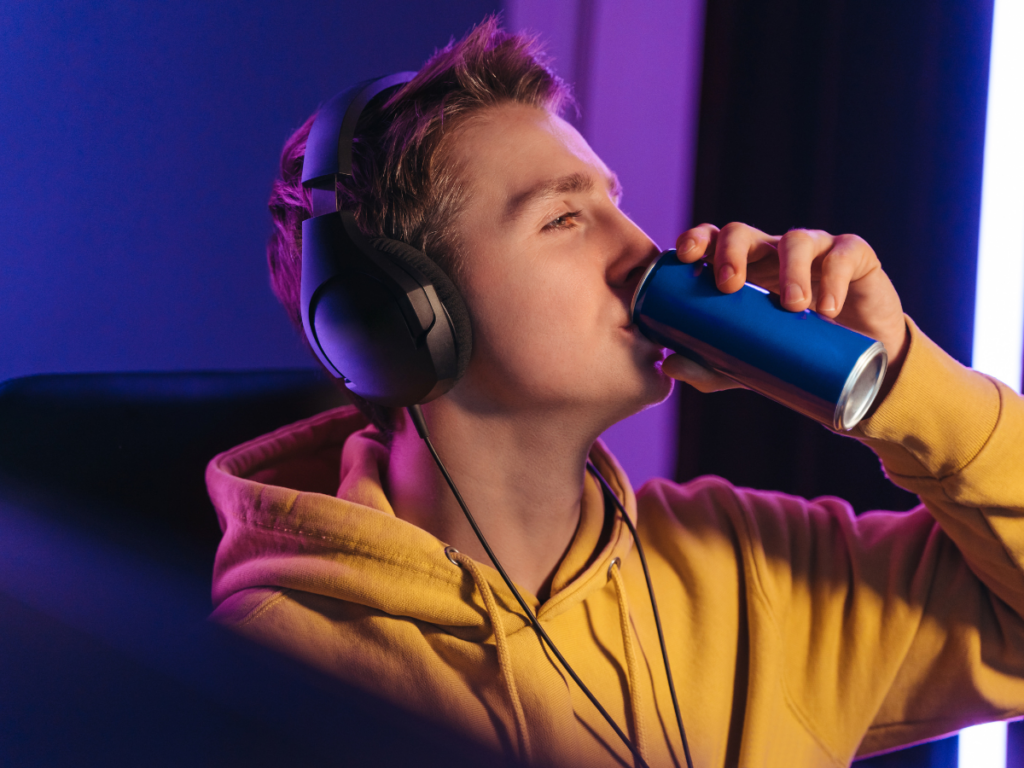Last updated on November 7th, 2024
Curious about caffeine for teen athletes? Learn the potential risks, benefits, and safe alternatives for energy and focus in young athletes.
As caffeine becomes increasingly popular among teens, from energy drinks to iced coffees and pre-workout supplements, it’s important for parents and athletes to understand how caffeine affects young bodies—especially those engaged in sports. While caffeine can enhance focus and energy, the reality is that its benefits have been studied mainly in adults, and there are real safety concerns for teens.
In this article, we’ll cover how caffeine affects performance, the potential risks for teen athletes, and healthier alternatives for maintaining energy and focus.
What Does Caffeine Do?
Caffeine is a stimulant that affects the central nervous system, blocking adenosine receptors in the brain to delay feelings of fatigue and increase alertness. For adult athletes, caffeine is known to enhance endurance, focus, and reaction time.
Application in Sports: Research shows caffeine can improve various types of athletic performance. For adults, the recommended dose is 3-6 mg of caffeine per kilogram of body weight, taken 30-60 minutes before a game or workout. For most adults, this equals around 200-400 mg of caffeine. However, these dosages are designed for fully developed bodies, and there is limited research on the effects and safety of caffeine in younger athletes.
Caffeine Recommendations for Teens
While caffeine is widely used to boost energy and focus, it’s important for teens to approach it with caution. The American Academy of Pediatrics discourages caffeine use for kids, citing potential health risks for developing bodies. However, Canada has provided some basic guidelines, suggesting the following daily limits:
- Ages 4 – 6: 45 mg (roughly half a cup of coffee)
- Ages 7 – 9: 62.5 mg
- Ages 10 – 12: 85 mg
- Adolescents (13-18): 85 – 100 mg
For teen athletes, I recommend limiting caffeine to below 100 mg per day, but ideally, they should avoid it as much as possible. Regular caffeine consumption for those under 18 is generally discouraged, as their bodies are still developing, and caffeine can have significant effects on heart rate, blood pressure, sleep, and even mood.
Despite these recommendations, it’s not uncommon to see young athletes drinking energy drinks or large iced coffees that exceed these safe daily limits. A single 16-ounce can of Monster, for example, contains around 140-160 mg of caffeine—well over the safe limit for adolescents. Such high caffeine levels can lead to dependency, increase anxiety, and interfere with the body’s natural energy systems.
Understanding and respecting these limits can help young athletes protect their health while optimizing performance through safer, more sustainable practices.
The Potential Risks of Caffeine for Teen Athletes
While caffeine can provide a temporary boost, the risks for teen athletes are significant, especially when consumed in high amounts or before physical activity:
- Heart health: Caffeine increases heart rate and blood pressure, which can be risky for teens with developing cardiovascular systems. During intense physical activity, caffeine’s effects on the heart can increase the likelihood of heart palpitations, irregular heartbeats, and overall strain.
- Sleep disruption: Caffeine’s effects can last for several hours, so consuming it in the afternoon or evening can disrupt sleep. Adequate sleep is essential for athletic recovery, muscle repair, and focus. A lack of sleep can hinder performance and slow recovery, increasing the risk of injury.
- Addiction and tolerance: Teens can quickly develop a tolerance to caffeine, meaning they may need higher amounts to achieve the same effect. This can lead to dependency, with withdrawal symptoms like headaches, irritability, and fatigue if they don’t consume caffeine regularly.
- Anxiety and overstimulation: High doses of caffeine can lead to jitters, anxiety, and increased nervousness, which can be counterproductive for athletes during high-pressure situations like games or tournaments.
Understanding Caffeine Content in Common Sources
Caffeine is present in many popular beverages and products, and it’s easy to consume more than intended. Here’s a breakdown of caffeine in common sources:
- Energy drinks: Energy drinks are popular but often contain high amounts of caffeine along with additional stimulants. For example, a 250-ml can of Red Bull has 80 mg of caffeine, while a 16-ounce can of Monster has 140-160 mg. Aside from caffeine, energy drinks may contain other ingredients that are not suitable for young athletes.
- Pre-workout supplements: Some pre-workout supplements can have very high doses of caffeine, often without clear labelling, leading to accidental overconsumption.
- Coffee and iced coffee: Coffee varies widely in caffeine content. A small brewed coffee or a single shot of espresso can contain around 60-80 mg, which is within safe limits. However, larger drinks, iced coffee, and cold brews often contain much higher amounts.
- Soft drinks and hot chocolate: Even soft drinks and hot chocolate contain caffeine, with about 20 mg in a hot chocolate and 40 mg in a soft drink. These amounts add up quickly, especially if an athlete has already had a coffee or energy drink earlier in the day.
Safe Alternatives to Caffeine for Energy and Focus
If a teen athlete feels they need caffeine, it’s a strong indication that something is off with their overall nutrition, hydration, or sleep. Caffeine should never be the first solution for low energy in a teen hockey player; instead, it’s essential to address these foundational areas first to ensure they’re getting consistent, natural energy to support performance:
- Balanced nutrition: A well-rounded diet provides steady, lasting energy and should always be the first area to check if energy levels are low. Meals and snacks rich in complex carbs, protein, and healthy fats—such as a banana with peanut butter or oatmeal with berries—fuel athletes and help prevent energy crashes.
- Proper hydration: Often overlooked, dehydration is a major cause of low energy and sluggishness. Teen athletes need to drink enough water throughout the day and ensure they stay hydrated during practices and games. For longer sessions, caffeine-free electrolyte drinks like BioSteel or Liquid IV can help restore hydration and boost energy naturally.
- Sleep and recovery: Lack of sleep is another common reason athletes may feel the need to reach for caffeine. Proper rest and recovery are essential for both energy and focus. Teen athletes require 8-10 hours of sleep per night to allow for muscle repair, mental clarity, and overall performance. Setting a consistent sleep routine is more effective in the long term than relying on caffeine.
- Natural energy boosters: For a quick, gentle energy boost, fresh fruits and nuts provide easily digestible sugars and healthy fats. Green tea offers a low dose of caffeine along with antioxidants, delivering a mild lift without overstimulation. Herbal teas like peppermint or ginger also provide a natural, refreshing pick-me-up without caffeine.
Before reaching for caffeine, teen athletes and their parents should prioritize these fundamental habits. A diet rich in nutrients, adequate hydration, and a regular sleep schedule provide the stable energy levels needed to support performance, focus, and overall health—no quick fixes required.
If Caffeine is Necessary, What’s the Safest Option?
If a teen athlete feels they absolutely need caffeine and their parents are on board, coffee or a small can of Red Bull is a safer option than high-caffeine energy drinks like Monster.
- Coffee: A small brewed coffee or a single shot of espresso usually contains under 100 mg of caffeine, within the safe daily limit. However, larger coffee drinks or cold brews should be avoided, as they often exceed this limit.
- Red Bull: At 80 mg of caffeine per 250 ml can, Red Bull stays within safe limits for teens, unlike Monster and other high-caffeine energy drinks.
However, if an athlete is experiencing low energy, the first areas to address are diet, hydration, and sleep. These factors have a much bigger impact on long-term performance and energy than a quick caffeine fix.
Take Away
While caffeine may seem like a convenient solution for boosting energy and focus, it presents unique risks for teen athletes. Consuming caffeine regularly or in high amounts can negatively affect heart health, sleep, mood, and performance, often outweighing any potential benefits.
For teen athletes, stable energy comes from a balanced diet, consistent hydration, and adequate sleep. By prioritizing these habits over quick fixes, young athletes can build a foundation for lasting performance and well-being. If caffeine is used, it should be done sparingly and with awareness of its effects, and under the guidance of a parent or coach.
By focusing on sustainable energy sources, teen athletes can unlock their full potential on and off the ice without the risks associated with caffeine.



